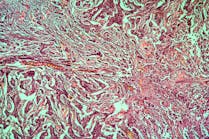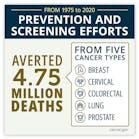An analysis of data from a randomized clinical trial for patients with stage 3 colon cancer found that those with PIK3CA mutations who took celecoxib, an anti-inflammatory drug, after surgery lived significantly longer and had longer disease-free survival compared to those without the mutation.
The study, highlighting a potential breakthrough in personalized cancer treatment, was led by clinical investigators at Dana-Farber Cancer Institute and Brigham and Women’s Hospital.
These findings are of the first clinical trial results to validate previous observations that adjuvant anti-inflammatory prostaglandin inhibitors, such as celecoxib, improve survival for PIK3CA-mutated colon cancer. The results are published in the Journal of Clinical Oncology.
To investigate the use of celecoxib on disease-free survival in patients with stage 3 colon cancer, Meyerhardt and colleagues initiated a randomized clinical trial, the Alliance 80702 trial, in 2010. The trial enrolled 2,526 patients between 2010 and 2015. After treatment, patients were randomized to receive adjuvant chemotherapy with fluorouracil, leucovorin, and oxaliplatin (FOLFOX) for three or six months with or without daily celecoxib for three years. Those taking celecoxib showed a moderate benefit, but the results, which were published in 2021, were not statistically significant.
During the execution of that trial, new evidence suggested that anti-inflammatory drugs might benefit some patients with colon cancer, but not others. For instance, in 2012 Dana-Farber researchers observed a signal in the Nurse’s Health Study and Health Professionals Follow-up Study, a long-term observational study of a broad spectrum of individuals. Patients in the study with colon cancer who regularly used aspirin, also an anti-inflammatory with a similar mechanism of action to celecoxib, had longer survival, but only if they had PIK3CA-mutated colon cancer. Other observational studies conducted since then have supported this association.
In this new study, Meyerhardt, Nowak, and colleagues performed comprehensive genetic sequencing called whole exome sequencing on 1200 tumor samples from patients from the Alliance 80702 trial. They found that 22% of patients had tumors with PIK3CA mutations. The patients with PIK3CA-mutated tumors who received celecoxib lived significantly longer overall compared to patients without PIK3CA mutations who received celecoxib.
In this analysis, a patient’s risk of dying was reduced by about 50%, and by about 60% when excluding patients who were using low-dose aspirin for reasons not related to their cancer treatment. Disease-free survival was also improved but did not reach statistical significance.





